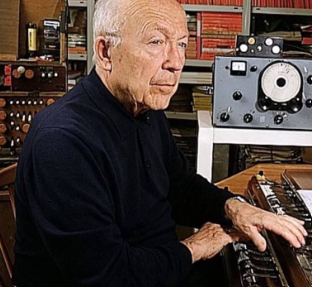Oskar Sala, a name synonymous with innovation and creativity in the world of music, was a German composer and one of the pioneers of electronic music. Born on July 18, 1910, in Greiz, Germany, Sala’s journey into the realm of music and technology would forever change the landscape of sound.
Trained as a violinist and a pianist, Sala’s early musical talents were evident from a young age. However, it was his encounter with the Trautonium, an early electronic musical instrument, that sparked his fascination with electronic sound synthesis. Developed by Friedrich Trautwein in the 1920s, the Trautonium became the foundation of Sala’s groundbreaking work.

In 1948, Oskar Sala developed the Mixtur-Trautonium, an advanced version of the Trautonium with added features and improved functionality. This innovative instrument allowed Sala to explore new and unique sounds, paving the way for the emergence of electronic music.
Throughout his illustrious career, Sala collaborated with renowned musicians, composers, and filmmakers, leaving an indelible mark on the world of soundtracks and film scores. One of his most notable contributions was the creation of the eerie and otherworldly soundtrack for Alfred Hitchcock’s classic thriller, “The Birds” (1963). Sala’s mastery of the Mixtur-Trautonium added an eerie and haunting atmosphere to the film, making it one of the most memorable aspects of the cinematic experience.
In addition to his work in the film industry, Sala composed various electronic music pieces, showcasing the endless possibilities of electronic sound synthesis. His compositions, ranging from experimental to ambient, challenged the traditional boundaries of music and embraced the limitless potential of electronic technology.
Sala’s influence extended beyond the realm of music, as he actively engaged with the scientific community to explore new applications of electronic sound. His research and experiments with sound synthesis technologies led to advancements in electronic music and sound engineering.
One of his most significant contributions to the world of music was his invention of the “Kleptro,” an innovative and portable version of the Mixtur-Trautonium. This invention made electronic sound synthesis more accessible to musicians and composers, further popularizing the use of electronic instruments in various genres of music.
Despite his pioneering work and significant impact on the world of electronic music, Sala’s contributions were often overshadowed by his contemporaries. However, his dedication to pushing the boundaries of music and technology laid the groundwork for future generations of electronic musicians and composers.
As we remember Oskar Sala’s groundbreaking work and revolutionary contributions to the world of music, we honor his legacy as a true trailblazer and visionary. His exploration of electronic sound synthesis and his commitment to pushing the boundaries of music continue to inspire and influence musicians and artists worldwide. Oskar Sala will forever be celebrated as a pioneer of electronic music, a true master of sound, and a visionary ahead of his time.








